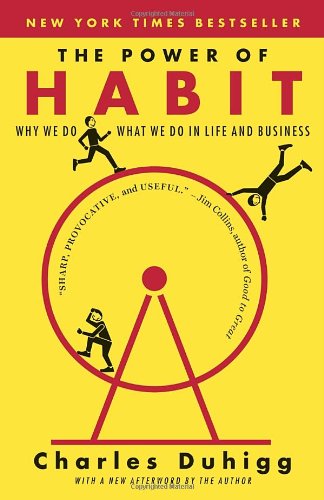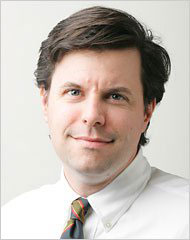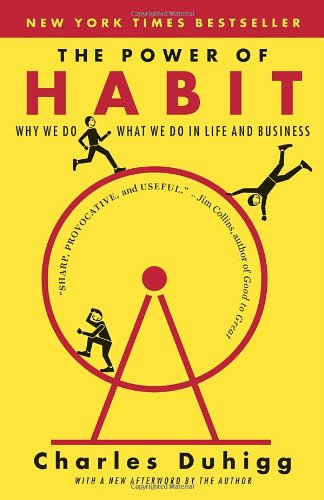
OVER 60 WEEKS ON THE NEW YORK TIMES BESTSELLER LIST
With a new Afterword by the author
In The Power of Habit, Pulitzer Prize–winning business reporter Charles Duhigg takes us to the thrilling edge of scientific discoveries that explain why habits exist and how they can be changed. Distilling vast amounts of information into engrossing narratives that take us from the boardrooms of Procter & Gamble to sidelines of the NFL to the front lines of the civil rights movement, Duhigg presents a whole new understanding of human nature and its potential. At its core, The Power of Habit contains an exhilarating argument: The key to exercising regularly, losing weight, being more productive, and achieving success is understanding how habits work. As Duhigg shows, by harnessing this new science, we can transform our businesses, our communities, and our lives.
NEW YORK TIMES BESTSELLER • NPR BESTSELLER • WASHINGTON POST BESTSELLER • LOS ANGELES TIMES BESTSELLER • USA TODAY BESTSELLER • PUBLISHERS WEEKLY BESTSELLER
NAMED ONE OF THE BEST BOOKS OF THE YEAR BY
The Wall Street Journal • Financial Times
“Sharp, provocative, and useful.”—Jim Collins
“Few [books] become essential manuals for business and living. The Power of Habit is an exception. Charles Duhigg not only explains how habits are formed but how to kick bad ones and hang on to the good.”—Financial Times
“A flat-out great read.”—David Allen, bestselling author of Getting Things Done: The Art of Stress-Free Productivity
“You’ll never look at yourself, your organization, or your world quite the same way.”—Daniel H. Pink, bestselling author of Drive and A Whole New Mind
“Entertaining . . . enjoyable . . . fascinating . . . a serious look at the science of habit formation and change.”—The New York Times Book Review
“Cue: see cover. Routine: read book. Reward: fully comprehend the art of manipulation.”—Bloomberg Businessweek
“Absolutely fascinating.”—Wired
“A fresh examination of how routine behaviors take hold and whether they are susceptible to change . . . The stories that Duhigg has knitted together are all fascinating in their own right, but take on an added dimension when wedded to his examination of habits.”— Associated Press
“There’s been a lot of research over the past several years about how our habits shape us, and this work is beautifully described in the new book The Power of Habit.”—David Brooks, The New York Times
“A first-rate book—based on an impressive mass of research, written in a lively style and providing just the right balance of intellectual seriousness with practical advice on how to break our bad habits.”—The Economist
“I have been spinning like a top since reading The Power of Habit, New York Times journalist Charles Duhigg’s fascinating best-seller about how people, businesses and organizations develop the positive routines that make them productive—and happy.”—The Washington Post
Q&A with Charles Duhigg

Q. What sparked your interest in habits?
A. I first became interested in the science of habits eight years ago, as a newspaper reporter in Baghdad, when I heard about an army major conducting an experiment in a small town named Kufa. The major had analyzed videotapes of riots and had found that violence was often preceded by a crowd of Iraqis gathering in a plaza and, over the course of hours, growing in size. Food vendors would show up, as well as spectators. Then, someone would throw a rock or a bottle.
When the major met with Kufa’s mayor, he made an odd request: Could they keep food vendors out of the plazas? Sure, the mayor said. A few weeks later, a small crowd gathered near the Great Mosque of Kufa. It grew in size. Some people started chanting angry slogans. At dusk, the crowd started getting restless and hungry. People looked for the kebab sellers normally filling the plaza, but there were none to be found. The spectators left. The chanters became dispirited. By 8 p.m., everyone was gone.
I asked the major how he had figured out that removing food vendors would change peoples’ behavior.
The U.S. military, he told me, is one of the biggest habit-formation experiments in history. “Understanding habits is the most important thing I’ve learned in the army,” he said. By the time I got back to the U.S., I was hooked on the topic.
Q. How have your own habits changed as a result of writing this book?
A. Since starting work on this book, I’ve lost about 30 pounds, I run every other morning (I’m training for the NY Marathon later this year), and I’m much more productive. And the reason why is because I’ve learned to diagnose my habits, and how to change them.
Take, for instance, a bad habit I had of eating a cookie every afternoon. By learning how to analyze my habit, I figured out that the reason I walked to the cafeteria each day wasn’t because I was craving a chocolate chip cookie. It was because I was craving socialization, the company of talking to my colleagues while munching. That was the habit’s real reward. And the cue for my behavior – the trigger that caused me to automatically stand up and wander to the cafeteria, was a certain time of day.
So, I reconstructed the habit: now, at about 3:30 each day, I absentmindedly stand up from my desk, look around for someone to talk with, and then gossip for about 10 minutes. I don’t even think about it at this point. It’s automatic. It’s a habit. I haven’t had a cookie in six months.
Q. What was the most surprising use of habits that you uncovered?
A. The most surprising thing I’ve learned is how companies use the science of habit formation to study – and influence – what we buy.
Take, for example, Target, the giant retailer. Target collects all kinds of data on every shopper it can, including whether you’re married and have kids, which part of town you live in, how much money you earn, if you’ve moved recently, the websites you visit. And with that information, it tries to diagnose each consumer’s unique, individual habits.
Why? Because Target knows that there are these certain moments when our habits become flexible. When we buy a new house, for instance, or get married or have a baby, our shopping habits are in flux. A well-timed coupon or advertisement can convince us to buy in a whole new way. But figuring out when someone is buying a house or getting married or having a baby is tough. And if you send the advertisement after the wedding or the baby arrives, it’s usually too late.
So Target studies our habits to see if they can predict major life events. And the company is very, very successful. Oftentimes, they know what is going on in someone’s life better than that person’s parents.

